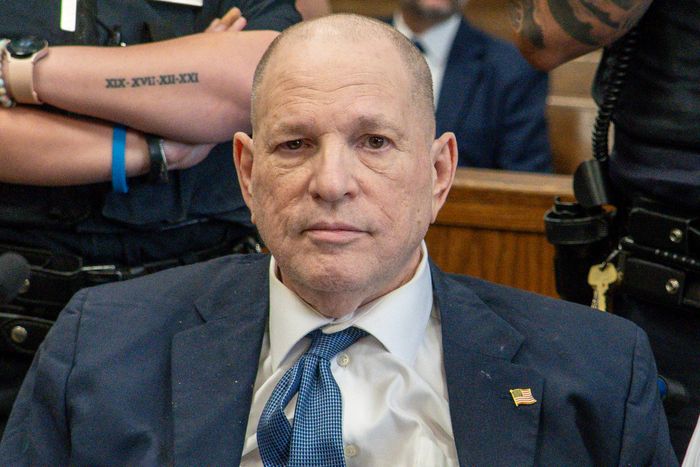Photo: Steven Hirsch-Pool/Getty Images On Tuesday, Harvey Weinstein will face a retrial in the New York rape case that became a pivotal moment for the Me Too movement. It’s a return to the same courthouse that saw him tried, convicted, and sentenced to 23 years in prison in March 2020 for sexually assaulting two women. The trial unfolded soon after multiple allegations had surfaced against Weinstein in late 2017, and the guilty verdict appeared to presage a new era for sexual-assault accusers.
Although men like Weinstein had long been insulated from accountability owing to their power and wealth, the legal outcome suggested survivors would now be protected — not their abusers.Weinstein’s further case laid the cultural groundwork for prosecutions of other high-profile men accused of grave sexual misconduct, such as R. Kelly, Danny Masterson, Jeffrey Epstein, and Sean “Diddy” Combs.

But despite Weinstein’s conviction at a separate rape trial in Los Angeles, he was able to successfully appeal his New York verdict, claiming the prosecutors’ strategy — eliciting testimony from other accusers about assaults for which he was not charged — dealt him an unfair hand in court. Manhattan District Attorney Alvin Bragg’s office decided it would retry Weinstein, leading to this week’s proceedings. The defendant has pleaded not guilty to the charges.
Here’s what you need to remember about Weinstein’s original sentence and what to know for his retrial.What is Harvey Weinstein being tried for?Weinstein is being tried on a total of three counts: two of criminal sexual acts in the first degree and one of rape in the third degree. The counts relate to alleged attacks on three women.
Two of the women, Mimi Haleyi and Jessica Mann, were accusers in Weinstein’s first trial. He was found guilty of sexually assaulting both of them. One of the criminal-sexual-act counts involves a woman who did not testify at his first trial and whose identity has not been publicly disclosed.
Weinstein is accused of sexually assaulting her at a downtown Manhattan hotel on one occasion in spring 2006. Prosecutors accuse Weinstein of forcibly performing oral sex on her.How is this different from Weinstein’s first New York trial?Weinstein was then facing five counts involving three accusers.
Mann, who had been an aspiring actress, told jurors that Weinstein had raped her at a Midtown East hotel around early 2013. Haleyi testified that Weinstein had forcibly performed oral sex on her at his Soho apartment in the summer of 2006. The criminal-sexual-act and rape charges related to their respective allegations.
Weinstein also faced two predatory-sexual-assault counts involving actress Annabella Sciorra, who told jurors Weinstein had raped her around late 1993. Weinstein was found not guilty of the two predatory-sexual-assault counts and acquitted of first-degree rape. He will not be retried on those counts.
Why was Weinstein’s 2020 conviction thrown out?On April 25, 2024, New York State’s highest court ruled Weinstein’s initial trial was unfair because women whom he was not charged with attacking also took the stand. “The remedy for these egregious errors is a new trial,” the court said in its 4-3 decision. “Defendant was convicted by a jury for various sexual crimes against three named complainants and, on appeal, claims that he was judged, not on the conduct for which he was indicted but on irrelevant, prejudicial, and untested allegations of prior bad acts,” the majority of judges said.
“We conclude that the trial court erroneously admitted testimony of uncharged, alleged prior sexual acts against persons other than the complainants of the underlying crimes because that testimony served no material non-propensity purpose.” In making this decision, the court sided with Weinstein’s legal team. Lead defense attorney Arthur Aidala had claimed that their testimony made his client seem so boorish that jurors were all but certain to vote guilty.
“It was his character that was on trial — it wasn’t the evidence that was on trial,” Aidala argued.Who were the other women included in the first trial?The three other accusers who testified were Dawn Dunning, Tarale Wulff, and Lauren Young. Dunning alleged Weinstein had touched her genitals without her consent at a business meeting and later proposed she could get movie roles in exchange for a “threesome.
” Wulff told jurors Weinstein had masturbated in front of her at work and later raped her at his apartment. Young claimed Weinstein had trapped her in a bathroom, grabbed her breast, and masturbated in front of her around early 2013. None of them will be testifying at Weinstein’s New York retrial.
When the verdict was overturned, Weinstein’s accusers and their representatives spoke out against the court’s decision. Douglas Wigdor, who at the time represented eight Weinstein accusers, called the decision a “major step back in holding those accountable for acts of sexual violence.”“Courts routinely admit evidence of other uncharged acts where they assist juries in understanding issues concerning the intent, modus operandi or scheme of the defendant,” Wigdor said in a statement.
“The jury was instructed on the relevance of this testimony, and overturning the verdict is tragic in that it will require the victims to endure yet another trial.”Will Weinstein get out of jail?Even if Weinstein were to be acquitted in this retrial, he would not go free anytime soon. He has been jailed since the guilty verdict came down and was sentenced to 16 years behind bars in his L.
A. rape trial. Weinstein is appealing that conviction, but the likelihood of that appeal being successful could depend on his retrial verdict.
Yes, there is a universe in which that could happen, but the chances of existence of said universe are very, very, very slim.So it sounds as if Weinstein could stay in jail — how is that going for him??Since day one of his incarceration, he has claimed inadequate medical treatment for a litany of health woes. Weinstein has been reeling from numerous maladies, including heart problems and leukemia, in his half-decade behind bars.
In early January 2025, Weinstein asked judge Curtis Farber to move up the date of his retrial, claiming in a meandering courtroom entreaty that he “can’t hold on anymore.”“Every day I’m on Rikers Island, it’s a mystery to me how I’m still walking,” Weinstein said. “I’m gasping for air.
I know I’m headed toward Bellevue [Hospital] any day now, and I can’t wait this long.” Weinstein told the court he was “holding on” in order to get justice for himself. “I’m not talking, like, ‘Oh, I’m the only one who’s suffering over there,’ there are so many people suffering at Rikers Island, so many of the people I’m with in prison going through similar problems,” Weinstein said, recognizing that he has the privilege of setting forth concerns about jailhouse medical care while others of the incarcerated don’t have the same “mouthpiece” for advocacy: “I speak for all of them when I tell you this is a medieval situation.
”How long will the retrial take?The retrial officially kicks off with jury selection on April 15 and is expected to last about four or five days. Opening statements are likely to start the week of April 21. Prosecutors said their case will run from approximately four to six weeks.
What has Weinstein said about the retrial?When asked for comment, a rep for Weinstein told Vulture, “Harvey looks forward to a swift and fair trial that will finally bring an end to this prolonged cycle of litigation, accusations, and media-driven narratives. He is confident that the evidence and testimony from the complainants will make clear his innocence of the charges.”Related What Does Harvey Weinstein’s Successful Appeal Really Mean?The 11 Craziest Moments in Harvey Weinstein’s Rape Trial.
Entertainment

Harvey Weinstein Tests Me Too Once Again

Here’s everything you need to know about the disgraced film producer’s return to New York City’s courtrooms.















